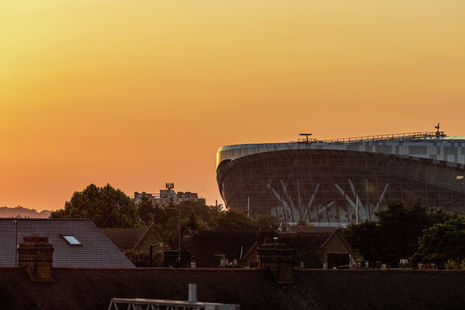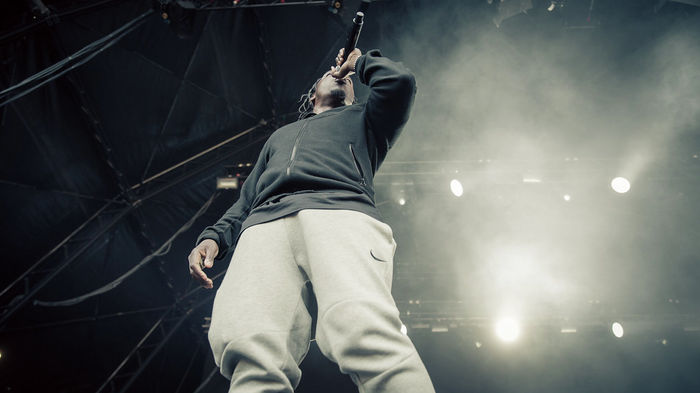‘Norf Face’: Profiling music in north London
Faisa Mohamed traces the evolution of UK rap and grime in north London, reflecting on the biggest names who have shaped the industry into what it is today

From Tottenham’s musical collectives BBK and OFB, north-west crooners Nines and Knucks and experimentalists Chip and Wretch 32, north London hosts some of the most monumental figures of UK hip-hop.
“BBK’s clashes gave us some of the most iconic grime moments”
Tottenham’s expansion in the late 19th century saw the arrival of the Windrush generation and the mass development of council housing. From these expansions came communities, and from these communities came musical collectives. Collectives were not a Tottenham phenomenon and had been especially prominent in hip-hop years before BBK and OFB began making music.
Boy Better Know (BBK) is a grime collective started by the brotherly duo Jamie and Joseph Adenuga, better known as JME and Skepta, from the Meridian estate in Tottenham. The group expanded to include Frisco, Jammer, Shorty and Wiley, up until his recent exit. For the younger generation, BBK is best known for their club anthem “Too Many Man”, but some can recall Jammer’s basement where they hosted Lord of the Mics, the first ever grime clash series. BBK’s clashes gave us some of the most iconic grime moments such as Wiley and Kano’s clash and the 2014 Red Bull Culture Clash, which they dominated.
“North London is the creative and innovative centre of UK rap”
On the opposite end of Tottenham stands Broadwater Farm. The shooting of Mark Duggan by the Met Police triggered decades of tension with the youth of Tottenham and erupted the estate into riots that would later be known as the 2011 London riots. Duggan left behind five children, the most vocal about the injustice being Kemani Duggan, better known as Bandokay, a member of the drill collective OFB.
The older members of the collective, led by RV and Headie One, are best known and whose frequent collaborations generated the underground hit “Know Better” in 2018, which popularised the “shh” ad-lib. At first the excessive use of the ad-lib was joked about on social media but now has become a symbol in drill, responding to the need for self-censoring after the Met’s successful removal of over a hundred drill videos in the last five years. Nonetheless, OFB has managed to overcome these restrictions. Headie One’s “18Hunna” is now one of the highest charting drill songs in history while OFB’s “Ambush”, rereleased with censored lyrics, eventually became the collective’s most popular song.
West of Tottenham lies Harlesden and Kilburn, home to Nines and Knucks, who both came into prominence as UK rap continued to diversify its sound. Road rap was an attempt to move away from the commercialization of grime in the mid-2000s, utilising YouTube and releasing mixtapes. Giggs is considered to have fathered the genre, which mixes American reality rap with the nuances of British culture. Nines adopted this sound and through the lucrative nature of YouTube, quickly became an underground sensation. With braggadocio bars and a baritone voice, Nines brought road rap mainstream, yet his steeze is unmatched by anybody else on the scene.
The likes of Avelino and Loyle Carner have become the face of “chill-rap” in the UK but it’s Knucks recent progression that makes him special. Since his 2016 debut “Breakfast At Tiffany’s”, Kilburn bred Knucks has created a sound unique to him with effortless suave, storytelling and beats that blend jazz and hip-hop. His projects have perfected art-on-art with old Hollywood references, skits and upcoming three-part film to dramatise the lyrics of “Leon the Professional”.
As rappers from the same area who came into prominence at the same time, Wretch 32 and Chip couldn’t have gone down more different paths. Often it feels like Wretch has been upstaged by flashier rappers from Tottenham but it’s easy to recall a time where he had three songs charting top-five simultaneously and one of the most iconic Fire in the Booth’s to date. Before the likes of Dave, who is often associated with political storytelling UK rap, Wretch had managed to intertwine contemporary issues with solemn and introspective music.
By the age of 20, Chip’s accomplishments in the genre had exceeded most and in a search for more he left for Atlanta where after signing with TI, his music combined his London steeze with American hip-hop and pop, best seen in his 2011 album Transition. Chip’s return to the UK in 2013 saw a return to his old sound that propelled him into stardom as a teenager. He moved away from pop-rap and back into grime, clashes, diss tracks and bashment influenced tunes. As engineers of early grime, both Chip and Wretch’s recent work are a testament to getting better with age.
With how centralised hip-hop is to America and south London, It’s easy to forget the impact of other communities like north London, where artists reformed and adapted a relatively new genre. Born through politics, immigration, racism and other factors, north London is the creative and innovative centre of UK rap.
 News / Hundreds of Cambridge academics demand vote on fate of vet course20 February 2026
News / Hundreds of Cambridge academics demand vote on fate of vet course20 February 2026 News / Judge Business School advisor resigns over Epstein and Andrew links18 February 2026
News / Judge Business School advisor resigns over Epstein and Andrew links18 February 2026 News / University Council rescinds University Centre membership20 February 2026
News / University Council rescinds University Centre membership20 February 2026 News / Petition demands University reverse decision on vegan menu20 February 2026
News / Petition demands University reverse decision on vegan menu20 February 2026 News / Caius students fail to pass Pride flag proposal20 February 2026
News / Caius students fail to pass Pride flag proposal20 February 2026










